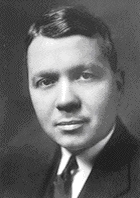Harold Urey
Urey, Harold
| Topics: |
Urey, Harold (1893-1981), an American physicist, received the 1934 Nobel Prize for the isolation of deuterium (heavy hydrogen). In 1931, Urey, with F. Brickwedde and G. Murphy, evaporated four liters of hydrogen down to one millimeter, and then measured the spectrum of the remainder. The result was a set of lines displaced slightly from the hydrogen lines, amounting to the discovery of deuterium, or heavy hydrogen. Urey's research group went on to separate isotopes of oxygen, carbon, nitrogen and sulfur, and worked on medical and biological applications of isotopes. Although he worked on the Manhattan Project, Urey was also an advocate of nuclear arms control, working actively with other scientists to promote global cooperation and to prevent nuclear proliferation and conflict.
Further Reading
Harold Urey- Short Biography (Nobelprize.org)
